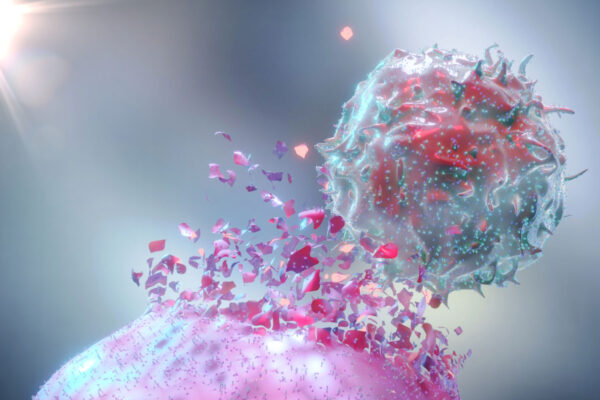
Cancer immunotherapy has witnessed remarkable advances in recent years, with much of the focus being on CAR-T cells. However, a great deal of research has gone into creating modified Natural Killer (NK) cells too. NK cells offer key advantages over T cells, such as functioning despite the absence of specific target-cell surface markers, and reduced risk of graft-versus-host disease (GVHD). They are cytotoxic soldiers of the innate immune system, playing a crucial role in cancer surveillance, and hold great immunotherapeutic promise.
NK cells exert their cytotoxicity through a balance of activating and inhibitory receptors. While activating receptors like NKG2D and CD16 trigger immune responses, inhibitory receptors, including killer immunoglobulin-like receptors (KIRs) and NKG2A, ensure self-tolerance and counteract excessive NK cell activity.
Unlike T cells, NK cells can directly recognize stress-induced molecules or other signals on the surface of infected or transformed cells without relying on the presentation of antigens by MHC molecules. This makes them potent candidates for cancer immunosurveillance, especially when the cancer target cells have altered MHC expression.
Isolating NK cells from peripheral blood mononuclear cells (PBMCs) is a common practice, but their low abundance and resting state pose challenges for clinical adoptive NK cell therapy. NK cells are not as abundant as some other types of immune cells in the blood. There are fewer NK cells available for isolation compared to, for example, T cells. This scarcity can be a challenge when attempting to collect a sufficient quantity of NK cells for therapeutic purposes. In addition, NK cells are often isolated in a resting or inactive state in which they may not be ready to mount a cytotoxic response. Activating NK cells is a crucial step in making them effective for therapeutic use.
Cytokine stimulation alone, using interleukins such as IL-2, IL-15, IL-21, IL-18, and IL-12, has shown modest success in expanding NK cells. Using genetically modified K562 feeder cells expressing membrane-bound IL-21 (mIL-21), CD64, CD86, and 4-1BBL has been shown to enhance expansion, purity, and functionality of NK cells, offering a promising solution for large-scale clinical applications1.
While it may be challenging to isolate and activate NK cells, they have promising off-the-shelf potential as an immunotherapeutic cell product. Allogenic NK cells from haploidentical related donors have been shown to be expanded in vivo without causing graft-versus-host disease, meaning they represent a possible option for creating a universal cell therapy1,2.
Researchers in the cellular immunotherapy space have worked with a number of cell types aside from T cells and NK cells, for instance, creating CAR-macrophages3 and tumor-antigen-primed dendritic cells4. The human immune system is a collection of functions carried out by many cell types and there is no lack of opportunity for aiming specific parts of that system at disease targets. This category of treatment options will diversify beyond the handful of approved T cell-based immunotherapies that exist, benefiting many, hopefully including those for whom no current cures exist.
References
- Wang, X., Yang, X., Wang, Y., Chen, Y., Yang, Y., Shang, S., Wang, W., & Wang, Y. (2023). Combination of expanded allogeneic NK cells and T cell-based immunotherapy exert enhanced antitumor effects. Cancers, 15(1), 251. doi.org/10.3390/cancers15010251
- Miller, J. S., Soignier, Y., Panoskaltsis-Mortari, A., McNearney, S. A., Yun, G. H., Fautsch, S. K., … & McGlave, P. B. (2005). Successful adoptive transfer and in vivo expansion of human haploidentical NK cells in patients with cancer. Blood, 105(8), 3051-3057.
- Anderson, N. R., Minutolo, N. G., Gill, S., & Klichinsky, M. (2021). Macrophage-based approaches for cancer immunotherapy. Cancer research, 81(5), 1201-1208.
- Asadirad, A., Baghaei, K., Hashemi, S. M., Dehnavi, S., Ghanbarian, H., Mortaz, E., … & Amani, D. (2022). Dendritic cell immunotherapy with miR-155 enriched tumor-derived exosome suppressed cancer growth and induced antitumor immune responses in murine model of colorectal cancer induced by CT26 cell line. International immunopharmacology, 104, 108493.
